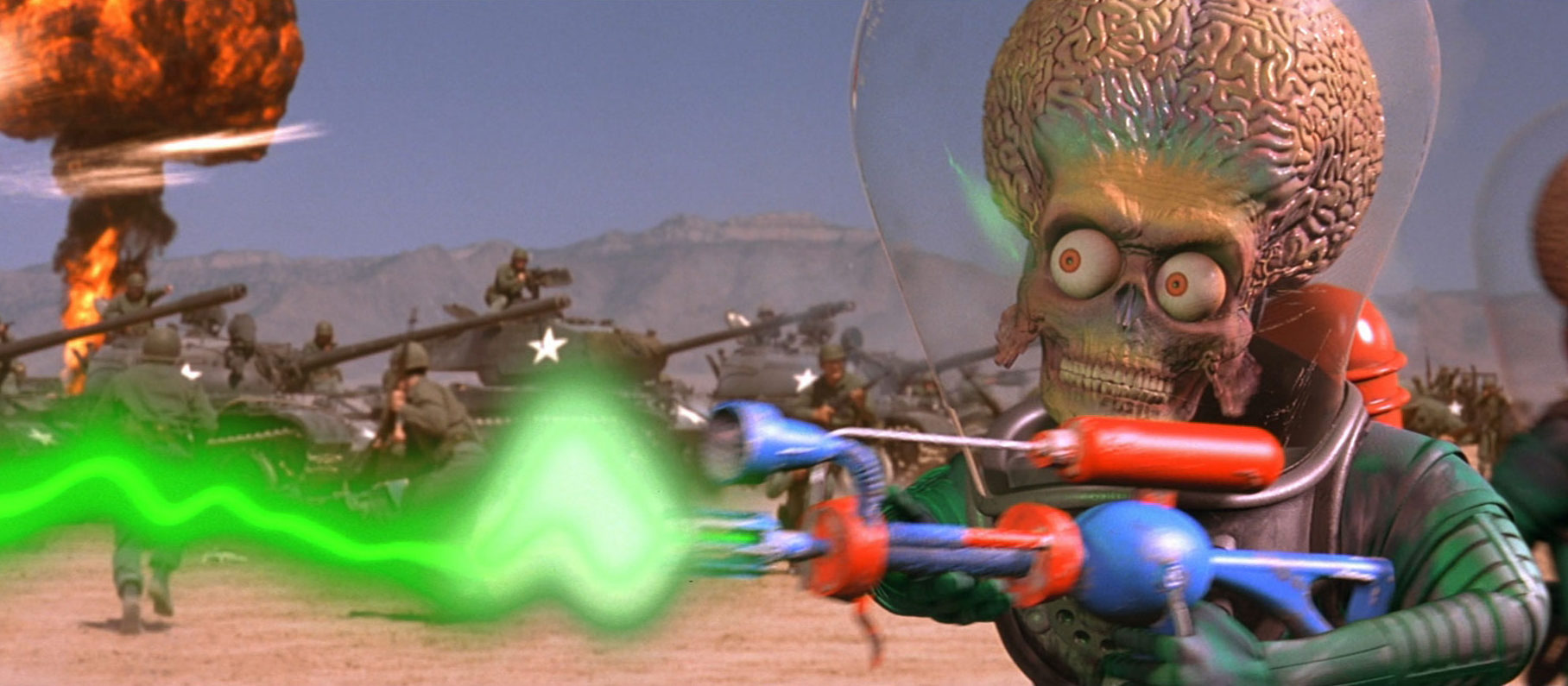
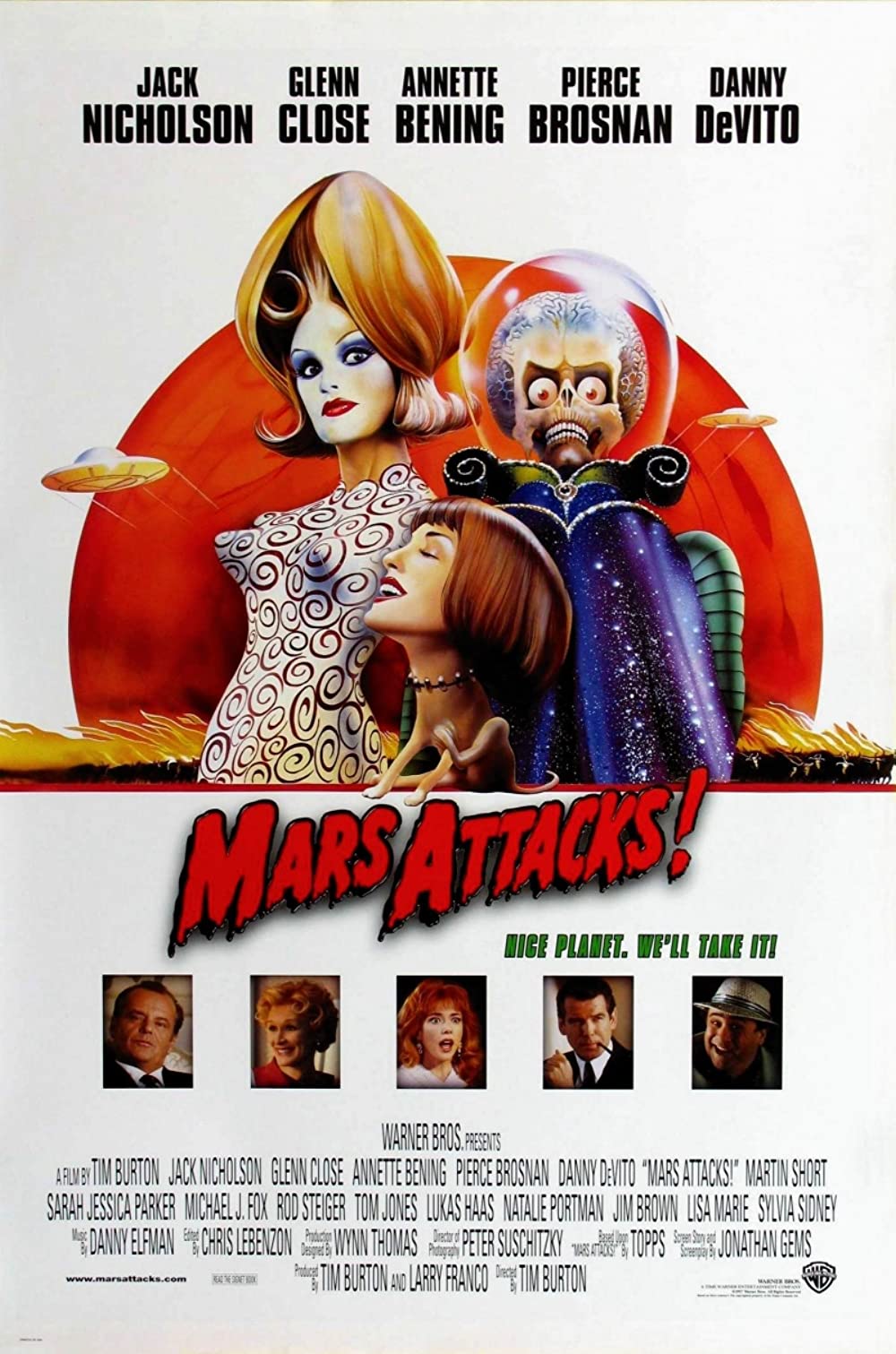
“Rest assured that working together we will soon come out at a very real outcome.”
Intentional or not, Mars Attacks! does a splendid job of lulling the audience into a stupor with its ambling first act. Hailing the well-versed with overt and stylistic references to any number of paranoid 1950s alien invasion B movies, it sluggishly sets about introducing a massive cross-sectional roster of notable cast members and building a sprawling, zany movie world that ranges from trailer parks and AA meetings to chintzy casinos and the Oval Office.
Chief among the cast is Jack Nicholson, who plays two characters—the President of the United States and a flamboyant real estate mogul. He is clearly having fun overacting both roles. Likewise Annette Bening as the mogul’s hippie wife, who is three months sober and believes the incoming aliens are the saviors of mankind. Likewise Pierce Brosnan as the President’s smarmy, pipe-smoking scientific advisor who is adamant that the advanced species will come in peace. Likewise Sarah Jessica Parker as a talk show host who goes nowhere sans chihuahua; and Danny DeVito as a feral gambling addict; and Martin Short as a libidinous press secretary; and Jack Black as a patriotic army private; and Rod Steiger as a nuke-happy general… the list goes on and includes such names as Glenn Close, Natalie Portman, Michael J. Fox, Jim Brown, Tom Jones, Lukas Haas, Pam Grier, Joe Don Baker, Sylvia Sidney (whose first film appearance was in the silent era!), and Christina Applegate.
As the “hubcap” flying saucers (a tip of the cap to Ed Wood, the subject of Burton’s previous film) arise from the canals of Mars and these eccentric caricatures sketch out a classic premise one winkingly-delivered line at a time, a clear parodic bent emerges, with the added wrinkle that Burton elects to use obvious CGI to weirdly augment the old school gimcrack aesthetic. But at this early stage there isn’t a clear purpose to the expansive homage other than wry amusement. Indeed it quickly overshoots the sweet spot of endearingly corny and becomes borderline cringe-inducing as a contrast develops between the visually intriguing mise en scène and the lackadaisical way it is observed. It almost begins to feel as if the parade of high profile actors in a silly throwback is going to be the extent of things. If Mars Attacks! had carried on in this manner for its duration, it might have been enjoyable in its own self-consciously quaint way—thankfully it doesn’t.
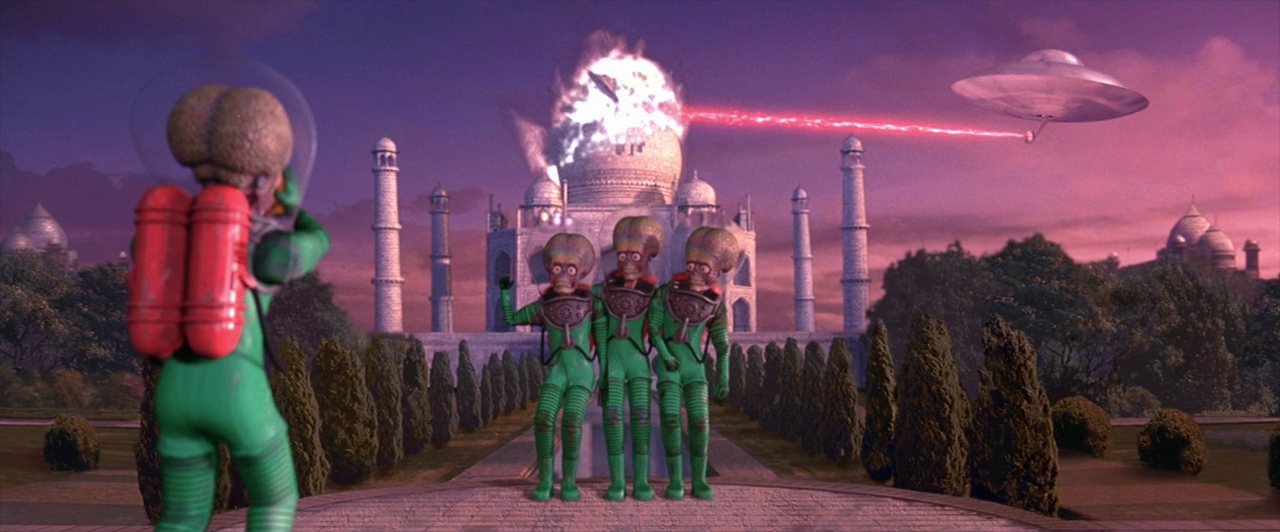
We know they’re extremely advanced technologically, which suggests—very rightfully so—that they’re peaceful. An advanced civilization, by definition, is not barbaric.
The film finally hits its stride about forty minutes in when the real stars arrive on the scene. I refer, of course, to the Martians themselves, who, after signaling peaceful intentions, quickly mow down about half of the all-star cast that Burton had assembled. This series of spectacular recognizable movie star deaths is handled with a complete lack of sentiment; in fact, it is positively gleeful in its gruesome depictions. It’s cartoon gore, obviously, but Burton seems to truly revel in satirizing Hollywood’s casual handling of death scenes. Consider that the grisly extravaganza only feels extreme because of its confrontational presentation—the way that Burton emphasizes the deaths with buildups and fakeouts but then carelessly moves on from the fallen once they’re obliterated—not the fact of the deaths themselves.
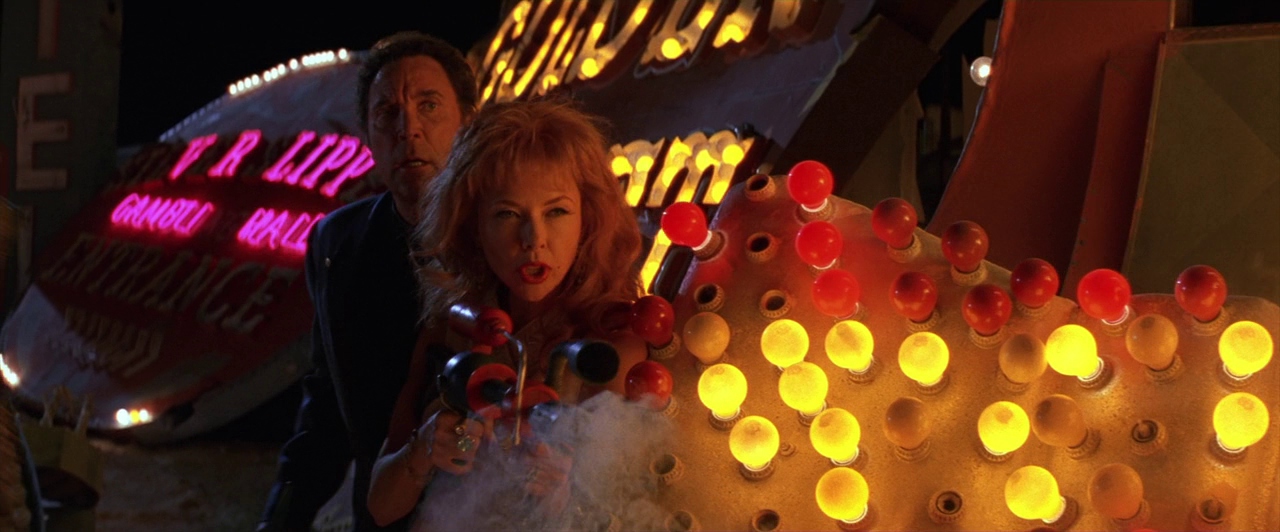
The way that he lingers on Martin Short’s bitten-off finger, or undercuts Jack Black’s heroic charge, or lets Danny DeVito try and bribe his way to survival before impassively vaporizing him with a ray gun, is blockbuster cinema’s flippant treatment of death taken to the extreme. Well, I take that back; but only because those aren’t even the most excessive grotesqueries on offer in Mars Attacks!. No, actually, before the grandmother of a donut shop cashier has unwittingly discovered that the alien’s kryptonite is a vintage yodeling song by Slim Whitman, we also bear witness to the hideous chopping and splicing of Sarah Jessica Parker and her pet chihuahua that yields two new bastard hybrids: dog-head-woman-body and woman-head-dog-body; the latter of which acquaints herself with Pierce Brosnan’s likewise disembodied noggin. All of this filtered through an increasingly wild visual aesthetic marked by bold color schemes, curved glass, reflections, fish eye lenses, bright costumes, and a retro score from Danny Elfman. This stark approach is clever and wickedly barbed at the very least, but for those of a certain temperament it also manages to be deeply funny.
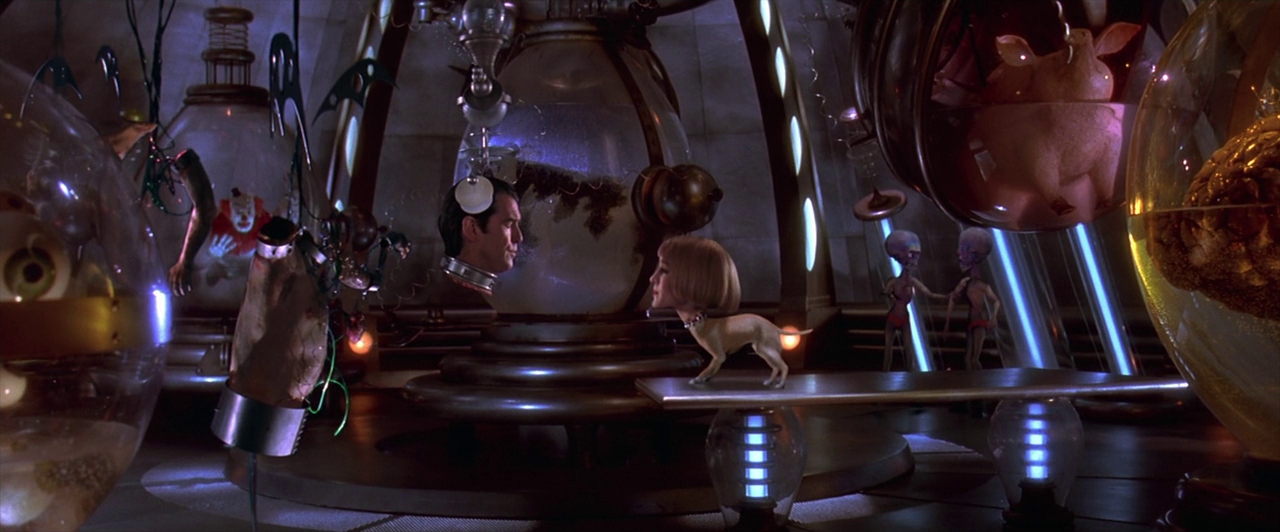
But the film’s general sense of humor is far from subtle. In fact, any time the aliens are on screen is an opportunity for cheerful silliness of all kinds. Based on the Topps’ trading card game from the 1960s, the aliens crafted by Industrial Light & Magic are the beating heart of Burton’s film. To be sure, Mars Attacks! is at its best when they are on screen, wobbling around in their undies, performing weird science experiments, viciously scheming, wreaking havoc, and wantonly slaughtering, all the while cackling with glee in untranslated quacks that sound like Gilbert Gottfried scat singing.
The Martians can be seen as a subversion of the two standard alien archetypes: the benevolent pacifist and the embodiment of pure evil. In contrast, the aliens of Burton’s film are, in essence, well-resourced, perverted thrillseekers with an appetite for mayhem and heads that look like testicles. That Burton and screenwriter Jonathan Gems also depict humanity as entirely devoid of redeeming qualities means that, strangely enough, the viewer ends up identifying and siding with the Martians. Instead of playing out with a sense of foreboding doom, then, as the half-baked plot unfolds we join in with the Martians as they blissfully rip the earth to shreds.
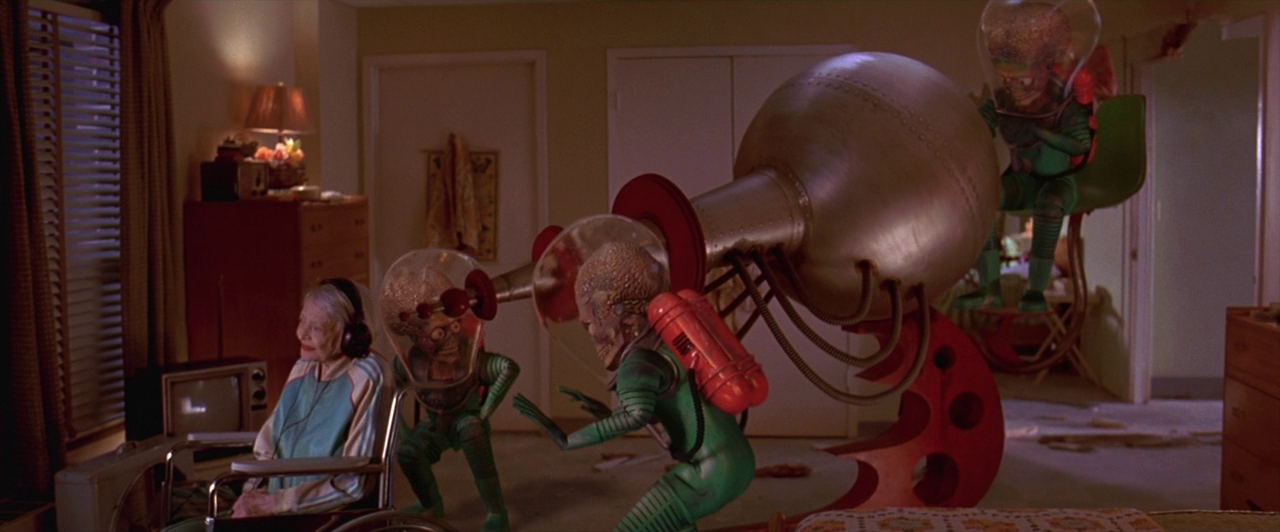
And yet, strange as it may seem (especially when set against Independence Day—which came out a few months before Mars Attacks! and features a similar scenario), Burton’s film is still, in a way, hopeful; an essential quality when trying to evoke the aura of classic science fiction. Whereas Roland Emmerich’s patriotic characters are rugged, charismatic, and determined, but also terrified, Burton’s, especially those in positions of authority, are narcissistic, naïve, and foolhardy; an unflattering portrait of modern society and its leaders. But in their ignorance they remain optimistic that they can make peace with the invaders. They can’t, which is part of the fun. But the glow remains.
In any case, even if the satirical elements pass over the viewer, Burton’s divisive slice of nostalgia-tinged sci-fi is a blast; a chaotic, basically meaningless free-for-all that stands out with its kitschy style and predilection for zapping its stars with retro blasters. It may be targeted at a niche audience, but if you have a taste for snide irreverence and jibe with the inside-baseball approach to the subject of its pastiche, Mars Attacks! is a real treat.
Sources:
Grierson, Tim. “This Week In Genre History: Mars Attacks! Might Have Wanted to Destroy Earth a Bit Too Much”. SyFy Wire. 8 December 2020.